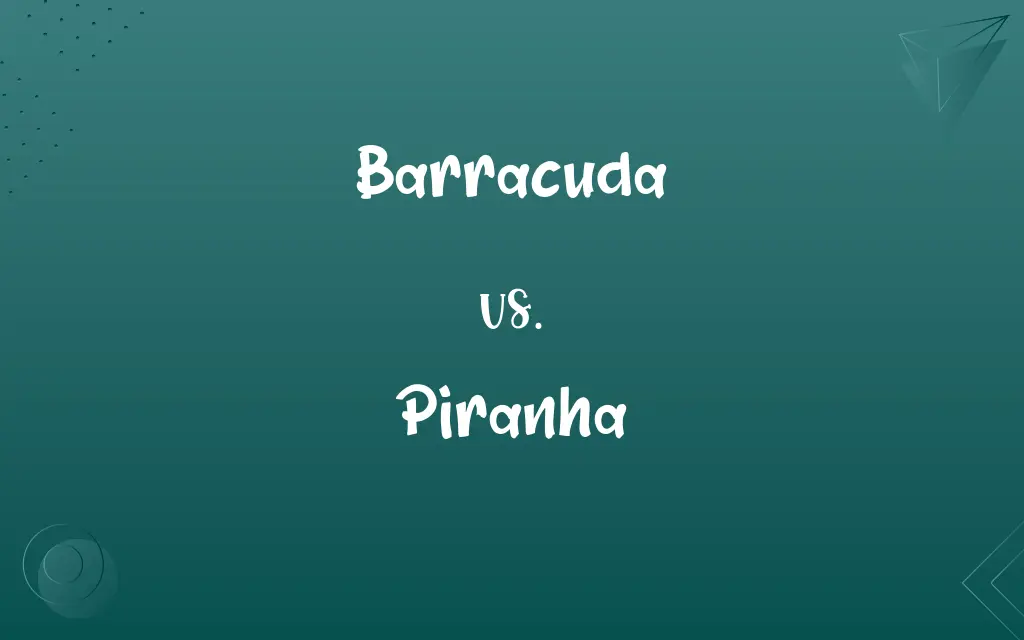Barracuda vs. Piranha: Know the Difference

By Shumaila Saeed & Dua Fatima || Updated on March 7, 2024
Barracudas are large, predatory fish known for their size and speed, thriving in subtropical oceans, while piranhas are smaller, freshwater fish famed for their sharp teeth and aggressive feeding frenzy in South American rivers.

Key Differences
Barracudas are solitary predators that inhabit the warm, open waters of subtropical and tropical oceans worldwide. They are recognized for their elongated bodies, which can exceed 6 feet in length, and their fearsome appearance, including a pointed head and sharp, prominent teeth. On the other hand, piranhas are primarily found in freshwater basins of South America, notably the Amazon River. These fish are considerably smaller, with most species averaging around 6 to 8 inches in length. Piranhas are notorious for their powerful jaws and razor-sharp teeth, capable of a rapid feeding frenzy.
Dua Fatima
Mar 07, 2024
While barracudas are known for their incredible speed, capable of reaching up to 27 mph to catch prey or evade predators, piranhas rely on a different hunting strategy. Piranhas are pack hunters, attacking in groups that can overwhelm larger animals or strip flesh from bones in minutes. This collective behavior contrasts sharply with the barracuda's solitary approach, where speed and surprise are key to their hunting success.
Shumaila Saeed
Mar 07, 2024
The diet of a barracuda consists mainly of fish, which they ambush with quick, powerful bursts. They are opportunistic feeders, sometimes even cannibalistic, targeting whatever fish they can overpower. Piranhas, conversely, have a more varied diet that can include fish, insects, and even larger animals' flesh when opportunities arise. However, it's a common misconception that piranhas are exclusively carnivorous; some species also consume plant matter, making them omnivorous.
Shumaila Saeed
Mar 07, 2024
In terms of danger to humans, barracudas are generally considered more of a risk due to their size and the power of their bite. While attacks on humans are rare and usually a case of mistaken identity, they can be serious. Piranhas, despite their fierce reputation, seldom attack humans, and most reported incidents involve single bites from startled fish rather than the frenzied attacks popularized in media.
Dua Fatima
Mar 07, 2024
The reproductive behaviors of these fish also differ. Barracudas lay eggs, which are then left to develop without parental care. In contrast, some piranha species display parental behaviors, with both parents guarding the eggs until they hatch and sometimes even protecting the fry until they are old enough to fend for themselves.
Shumaila Saeed
Mar 07, 2024
ADVERTISEMENT
Comparison Chart
Habitat
Subtropical and tropical oceans worldwide.
Freshwater basins in South America.
Dua Fatima
Mar 07, 2024
Hunting Strategy
Solitary predators, relying on speed and surprise.
Pack hunters, known for their aggressive feeding frenzy.
Shumaila Saeed
Mar 07, 2024
Diet
Mainly fish, including opportunistic cannibalism.
Varied, including fish, insects, and occasionally plant matter.
Shumaila Saeed
Mar 07, 2024
Danger to Humans
Potentially dangerous due to size and bite power.
Rarely attack humans; attacks are usually minor.
Hifza Nasir
Mar 07, 2024
ADVERTISEMENT
Reproductive Behavior
Lay eggs without parental care.
Some species guard their eggs and young.
Shumaila Saeed
Mar 07, 2024
Barracuda and Piranha Definitions
Barracuda
Can reach lengths of up to 6 feet.
The large barracuda was a formidable sight in the open water.
Shumaila Saeed
Mar 07, 2024
Piranha
A small, freshwater fish famous for sharp teeth and aggressive behavior.
The school of piranhas quickly devoured the meat.
Dua Fatima
Mar 07, 2024
Barracuda
Notable for an elongated body and fearsome appearance.
Divers spotted a lone barracuda lurking near the coral reef.
Dua Fatima
Mar 07, 2024
Piranha
Found in South American rivers, particularly the Amazon.
Piranhas are a common sight in the murky waters of the Amazon.
Shumaila Saeed
Mar 07, 2024
ADVERTISEMENT
Barracuda
Solitary hunters of the ocean.
A barracuda can often be seen hunting alone, relying on its speed.
Hifza Nasir
Mar 07, 2024
Piranha
Attacks on humans are more myth than reality.
Despite their fierce reputation, piranha attacks on humans are extremely rare.
Shumaila Saeed
Mar 07, 2024
Barracuda
A large, predatory marine fish known for its speed.
The barracuda swiftly caught the small fish with its sharp teeth.
Shumaila Saeed
Mar 07, 2024
Piranha
Known for their rapid feeding frenzy.
The piranhas entered a feeding frenzy when they sensed blood in the water.
Hifza Nasir
Mar 07, 2024
Barracuda
Attacks on humans are rare but can be serious.
Swimmers are advised to be cautious of barracudas in tropical waters.
Dua Fatima
Mar 07, 2024
Piranha
Some species exhibit parental care.
After laying eggs, the piranha parents guarded them vigilantly.
Dua Fatima
Mar 07, 2024
Barracuda
Any of various predatory marine fishes of the genus Sphyraena, having an elongated body and a projecting lower jaw with fanglike teeth.
Shumaila Saeed
Oct 19, 2023
Piranha
Any of various tropical American freshwater fishes of several genera, especially Serrasalmus and Pygocentrus, that have sharp teeth and are known for attacking and feeding on live animals. Also called caribe.
Shumaila Saeed
Oct 19, 2023
Barracuda
Any large marine fish of the genus Sphyraena that have elongated bodies, a projecting lower jaw, displaying prominent fang-shaped teeth, and are aggressive predators.
Shumaila Saeed
Oct 19, 2023
Piranha
(ichthyology) Any of the carnivorous or frugivorous freshwater fish living in South American rivers and belonging to the subfamily Serrasalminae.
Shumaila Saeed
Oct 19, 2023
Barracuda
Any of several voracious pikelike marine fishes allied to the gray mullets, constituting the genus Sphyræna and family Sphyrænidæ. The great barracuda (Sphyræna barracuda) of the West Indies, Florida, etc., is often six feet or more long, and as dangerous as a shark. In Cuba its flesh is reputed to be poisonous. Sphyræna Argentea of the Pacific coast and Sphyræna sphyræna of Europe are smaller species, and are used as food.
Shumaila Saeed
Oct 19, 2023
Piranha
Small voraciously carnivorous freshwater fishes of South America that attack and destroy living animals
Shumaila Saeed
Oct 19, 2023
Barracuda
A large edible fresh-water fish of Australia and New Zealand (Thyrsites atun).
Shumaila Saeed
Oct 19, 2023
Barracuda
Any voracious marine fish of the genus Sphyraena having an elongated cylindrical body and large mouth with projecting lower jaw and long strong teeth
Shumaila Saeed
Oct 19, 2023
Repeatedly Asked Queries
What's the primary habitat difference between barracudas and piranhas?
Barracudas live in subtropical and tropical oceans, while piranhas inhabit freshwater rivers in South America.
Dua Fatima
Mar 07, 2024
How do barracudas and piranhas hunt?
Barracudas are solitary, fast predators, whereas piranhas hunt in groups and can overwhelm larger animals.
Shumaila Saeed
Mar 07, 2024
Do piranhas attack humans?
Actual attacks on humans are rare and usually involve minor bites.
Dua Fatima
Mar 07, 2024
Do piranhas have any predators?
Yes, piranhas have natural predators, including larger fish, birds, and caimans.
Shumaila Saeed
Mar 07, 2024
Can piranhas really strip a cow to the bone?
This is exaggerated, but piranhas can rapidly consume flesh in a feeding frenzy when conditions are right.
Shumaila Saeed
Mar 07, 2024
What do barracudas eat?
They primarily eat fish, using speed and surprise to catch their prey.
Dua Fatima
Mar 07, 2024
Can barracudas and piranhas coexist in the same habitat?
No, barracudas live in saltwater oceans, while piranhas are freshwater fish.
Shumaila Saeed
Mar 07, 2024
Are barracudas dangerous to humans?
Yes, they can be due to their size and bite, but attacks are rare and usually due to mistaken identity.
Shumaila Saeed
Mar 07, 2024
What's the significance of a barracuda's elongated body?
It aids in their speed and agility, making them effective predators.
Shumaila Saeed
Mar 07, 2024
What role do piranhas play in their ecosystem?
They are important for controlling fish populations and cleaning up dead or dying animals in their freshwater habitats.
Hifza Nasir
Mar 07, 2024
What is the reproductive behavior of barracudas?
Barracudas lay eggs and do not exhibit parental care.
Dua Fatima
Mar 07, 2024
Why do piranhas have such a fearsome reputation?
Their sharp teeth and potential for a rapid feeding frenzy contribute to their fearsome reputation, though it's often exaggerated.
Shumaila Saeed
Mar 07, 2024
Are all piranhas carnivorous?
While known for their sharp teeth and carnivorous diet, some piranhas also consume plant matter, making them omnivorous.
Shumaila Saeed
Mar 07, 2024
How big do piranhas get?
Most piranha species grow to about 6 to 8 inches in length.
Dua Fatima
Mar 07, 2024
Share this page
Link for your blog / website
HTML
Link to share via messenger
About Author
Written by
Shumaila SaeedShumaila Saeed, an expert content creator with 6 years of experience, specializes in distilling complex topics into easily digestible comparisons, shining a light on the nuances that both inform and educate readers with clarity and accuracy.
Co-written by
Dua Fatima







































































